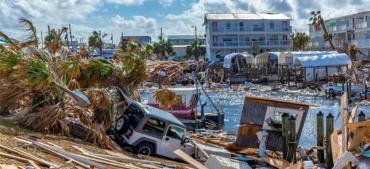
President Donald Trump’s national emergency declaration that diverts $8 billion in already appropriated money for border security -- most significantly, $3.6 billion from the Defense Department’s construction account – is unlikely to have a direct impact on Florida, although it is uncertain what projects on what military bases could be affected.
What will have a direct impact on Florida, specifically the Panhandle, is the $333 billion bipartisan spending package adopted 83-16 in the Senate and 300-128 in the House on Feb. 14.
Not only did the compromise funding bill -- the Consolidated Appropriations Act of 2019, adopted to avoid another government shut-down -- only include $1.375 billion for Trump’s $5.7 billion border wall budget request, it includes no money for assistance to Panhandle communities and farmers devastated by Hurricane Michael in October 2018.
In January, the Senate approved a $12.7 billion disaster aid allocation for victims of 2018 natural disasters while the House earmarked $14.2 billion to assist communities and businesses in recovering from hurricanes, wildfires and floods.
Former Republican governor and newly-elected Sen. Rick Scott joined Florida’s 13 House Democrats in approving the spending bill while the state’s 14 GOP Congressional representatives and Sen. Marco Rubio voted against it.
"Three weeks ago, Senate Republicans voted overwhelmingly to help Florida communities devastated by Hurricane Michael,” Rubio said in a statement. “But now congressional negotiators failed to include disaster funding in this package so they can use it as leverage in an upcoming effort to lift spending caps. I will not support using devastated communities in Florida as pawns for some future legislative deal.”
U.S. Rep. Neal Dunn, R-Panama City, whose district was pounded by the near-Category 5 storm, said he was “stunned and disappointed” that the spending package does not include the previously promised disaster relief for the Panhandle.
“The spending deal worked out by House and Senate leadership fails to address the needs of those in North Florida,” he wrote in a series of tweets. “It includes no money for Hurricane Michael disaster relief, does not seriously address the humanitarian crisis at our border, and was finalized at the last minute with little time for members to review the details.”
Dunn, a surgeon first elected to represent Florida’s 2nd congressional district in 2016, said he could not “in good conscience support a bill that completely ignores all those who were devastated by disasters in 2018. We cannot continue to kick the can down the road on disaster funding.”
According to the state’s Office of Insurance Regulation (OIR), as of Feb. 15, more than 144,300 property insurance claims totaling almost $5.6 billion in damages had been filed since Michael ripped across Florida’s Panhandle on Oct. 10, killing at least 43 and forcing 375,000 to evacuate.
More than 102,000 people have registered for assistance and 16 counties have qualified for federal aid in recovering from the storm, which wrecked 2.8 million acres of agricultural and forest land and destroyed an estimated $1.49 billion in crops, including $1.3 billion in lost timber.
“Florida’s Panhandle needs help now, not six months down the road,” Dunn said. “It’s been four months since Hurricane Michael hit and much of the Panhandle is still in ruins, with people living in tents and surviving on the bare essentials. We need to pass disaster funding and we need to do it now.”
Florida Republicans aren’t the only congressional representatives angry that disaster funding was not included in the spending bill. Representatives from the other states slammed by Michael – Georgia and the Carolinas – also expressed dismay.
“In October, Georgia was hit hard by one of the strongest hurricanes the state has ever seen. The destruction was unimaginable. It battered cities and small towns and destroyed thousands of acres of farmland,” Rep. Austin Scott, R-Georgia, said. “For months, I have worked tirelessly with my colleagues in the House for timely disaster relief for farmers and communities impacted by Hurricane Michael and the other natural disasters of 2018.”
The adopted spending package left him “disappointed and frustrated,” he said in a prepared statement.
“The assurances we have heard for months that relief would be included in spending measures to reopen the government were empty promises,” Scott concluded.
As a senior member of the House Agriculture Committee, Scott said he would push to get a disaster assistance bill approved as a separate -- and immediate -- appropriation.
Both congressional “chambers need to negotiate without delay and get this done,” agreed Rep. Darren Soto, D-Florida, in a tweeted response to Dunn’s statements.
John Haughey is a Watchog.org contributor covering Florida news.


